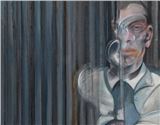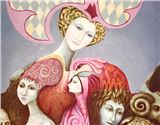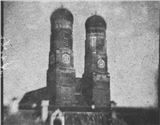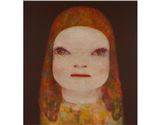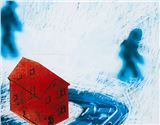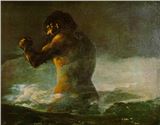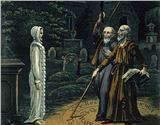Biography
Early Life & Education
Günther Uecker, born on March 13, 1930, in Wendorf, Mecklenburg-Schwerin, Germany, was shaped by the stark realities of war and displacement. As a teenager during the final days of World War II, he helped fortify his family home against advancing forces and later was forced by Soviet soldiers to retrieve bodies from the Baltic Sea. In 1949, he began his artistic training in Wismar, continuing at the Berlin-Weißensee School of Art, where he worked in the state-mandated style of social realism, contributing to large-scale public sculptures. Following the East German uprising of 1953, Uecker fled to West Germany and enrolled at the Kunstakademie Düsseldorf, studying under Otto Pankok. There, in 1956, he began incorporating nails into his work—a radical gesture that would define his artistic language.
Key Life Events & Historical Context
Uecker’s life unfolded against the backdrop of 20th-century Europe’s most turbulent chapters. His flight from East to West Germany in 1953 mirrored the broader ideological fracture of the Cold War. Settling in Düsseldorf, he became a central figure in the postwar avant-garde, co-founding the ZERO group in 1961 with Heinz Mack and Otto Piene. The collective championed a radical renewal of art through light, motion, and minimal intervention, staging groundbreaking exhibitions across Europe. Uecker’s work evolved in response to global crises; after the Chernobyl disaster in 1986, he created *Aschebilder* (ash pictures), using radioactive soil and ash to confront ecological and existential fragility, underscoring his sustained engagement with the moral dimensions of art.
Influences
Uecker’s artistic vision was galvanized by his collaboration with Heinz Mack and Otto Piene, whose shared pursuit of artistic rebirth through light and elemental materials redefined postwar European art. The ZERO group’s ethos—rooted in silence, clarity, and cosmic resonance—offered a counterpoint to the gestural intensity of German Informel. Beyond his immediate circle, Uecker drew inspiration from early 20th-century Eastern European avant-garde movements and Eastern philosophies, particularly Zen Buddhism, which informed his meditative approach to materiality and space.
Artistic Career
Uecker’s career gained international recognition through pivotal appearances at documenta 4 in Kassel (1968) and the 35th Venice Biennale (1970), where he represented Germany. His first solo exhibition in the United States took place at the Howard Wise Gallery in New York in 1966, introducing American audiences to his nail reliefs. Over the decades, he expanded into architectural interventions, most notably designing the prayer room for the reconstructed Reichstag in Berlin (2000), a luminous space embedded with thousands of white nails, symbolizing peace and reflection.
Artistic Style & Themes
Uecker’s work is defined by the rhythmic, often hypnotic arrangement of nails on canvas and sculptural surfaces, creating dynamic fields that modulate light and shadow. These textured reliefs evoke natural phenomena—fields of grain, rippling water, or star fields—inviting contemplative engagement. His use of monochrome, particularly white, underscores themes of purification and transcendence. Key works such as *a-x Zero Garden* (1966) exemplify his ability to generate optical movement through static materials, transforming industrial elements into poetic forms.
Exhibitions & Representation
Uecker’s work has been presented in major international forums, including documenta and the Venice Biennale, affirming his status within the postwar avant-garde. Solo exhibitions at the Kunsthalle Düsseldorf (1983) and the Kunsthalle der Hypo-Kulturstiftung, Munich (1990), solidified his institutional presence. His prayer room for the Reichstag stands as both an architectural and spiritual landmark. Represented by Galerie Schüppenhauer in Cologne for decades, his work is held in the collections of the Museum of Modern Art, New York, the Art Institute of Chicago, and the Centre Pompidou, Paris.
Awards & Accolades
Uecker received the Order of Merit of North Rhine-Westphalia in 1995 and the Order of Merit of the Federal Republic of Germany in 2000, recognizing his cultural contributions. In 2008, he co-founded the ZERO Foundation with Otto Piene, Heinz Mack, and Mattijs Visser, ensuring the preservation and scholarly study of the ZERO movement’s legacy.
Fun Fact
In 1978, Uecker staged an unannounced performance at the Kunstakademie Düsseldorf, riding a camel through its corridors—an act of surreal defiance that blurred the boundaries between life, ritual, and artistic practice, embodying the spirit of ZERO’s experimental ethos.
Legacy
Uecker’s integration of seriality, light, and industrial materials influenced subsequent generations of artists working in minimalism, kinetic art, and installation. His emphasis on meditative process and spiritual resonance prefigured contemporary explorations of art as a site of mindfulness and ethical reflection. The ZERO movement, revitalized in part through his lifelong advocacy, continues to inform curatorial and artistic dialogues across Europe and beyond. Through his alchemical transformation of nails into fields of light and meaning, Uecker redefined sculpture as a living, breathing presence—quietly insistent, profoundly human, and enduringly luminous.
Selected Solo Exhibitions
2025
2022
2016
Selected Group Exhibitions
2025
- Minimal ,Pinault Foundation, Bourse de Commerce ,1e, Paris, France
- Tides of Time ,Achenbach Hagemeier, Düsseldorf ,Düsseldorf, Germany
- Behind the Screen Vol.1 – The Intermediate Space ,Galería RGR ,Ciudad Universitaria, Mexico City, Mexico
- The Art of Sculpture ,Galerie von Vertes, Zürich ,Zürich, Switzerland
- Sendung aus dem Gegen-Raum Mail Art, Plakate und Faltrollos alternativer DDR-Kunstszenen ,Brandenburg State Museum of Modern Art (BLMK), Cottbus ,Cottbus, Germany
- Von Renoir bis Warhol. Das Osthaus Museum zeigt seine Schätze ,Osthaus Museum Hagen ,Haagen, Germany
- Collection Highlights ,Galerie Utermann ,Dortmund, Germany
- Vertigo ,Villa Carmignac ,Hyères, France
- TEFAF Maastricht: Stand 433 ,The Mayor Gallery ,Mayfair, London, UK
- New acquisitions: from Kollwitz to Schumacher ,Galerie Utermann ,Dortmund, Germany
2024
- Electric Dreams: Art And Technology Before The Internet ,Tate Modern ,Bankside, London, UK
- Lucio Fontana and Günther Uecker: Spazio Totale: L’arte nella sua forma più pura ,Cortesi Gallery, Lugano ,Lugano, Switzerland
- Paper / Elements: Kunst aus Papier und die vier Elemente ,Villa Zanders Art Museum ,Bergisch Gladbach, Germany
- Accrochage ,Galerie Boisséree ,Cologne, Germany
- ONLINE: Black & White: A Never Fading Beauty ,Gallery Ludorff ,Düsseldorf, Germany
- Material States: Yves Klein and Günther Uecker ,Lévy Gorvy Dayan, London ,Mayfair, London, UK
- Déclinaisons Sur Papier ,Galerie La Ligne ,Zürich, Switzerland
- Recent Acquisitions Spring 2024 ,Gallery Ludorff ,Düsseldorf, Germany
- 1914/1918: Damals nicht, jetzt nicht, niemals! ,Kunsthalle Rostock ,Rostock, Germany
- Poesie der Elemente ,Wilhelm Hack Museum ,Ludwigshafen Am Rhein, Germany
- Korrespondenzen, Differenzen, Gleichklang des Ungleichen ,Galerie Koch ,Hannover, Germany
- From Fibre To Form ,Kunsthaus Dahlem ,Dahlem, Berlin, Germany
- Network ,Skarstedt, Paris ,8e, Paris, France
2023
- Works from a private collection: From Bourgeois to Valdés ,Beck & Eggeling Dusseldorf ,Düsseldorf, Germany
- Extreme Tension: Art Between Politics And Society 1945–1990 ,Neue Nationalgalerie ,Mitte, Berlin, Germany
- Hommage à Günter Fruhtrunk ,Walter Storms Galerie, Munich ,Munich, Germany
- Bringing Line to Light ,Setareh Gallery, Düsseldorf (Königsallee) ,Düsseldorf, Germany
- From Kubin to Uecker ,Galerie Utermann ,Dortmund, Germany
- 60th Anniversary Exhibition ,Yares Art Gallery, New York ,57th Street, New York, USA
- Brauchen und Haben: Blick in die Sammlung #6 ,Kunsthalle Bielefeld ,Bielefeld, Germany
- Bildet Banden ,Setareh Gallery, Berlin ,Berlin, Germany
- Art In The Rhineland ,Gallery Ludorff ,Düsseldorf, Germany
- Mouvement ,Gimpel & Müller ,6e, Paris, France
- Not Bronze ,The Mayor Gallery ,Mayfair, London, UK
2022
- Snowfall: Surface & Seeing ,Sotheby's Aspen ,Aspen, Colorado, USA
- The Collection Osmers: From Archipenko to Zero ,Kunsthalle Bremen ,Bremen, Germany
- Christmas Selection ,Galerie Thomas / Thomas Modern ,Munich, Germany
- Sunset: A Celebration of the Sinking Sun ,Kunsthalle Bremen ,Bremen, Germany
- Eat, Sleep, Paint, Repeat ,Omer Tiroche Gallery, London ,Mayfair, London, UK
- Monochrome Multitudes ,Smart Museum of Art, University of Chicago ,Hyde Park, Chicago, Illinois, USA
- Under Construction ,Austin / Desmond Fine Art ,Bloomsbury, London, UK
- Drei Farben: Blau, Weiss, Rot ,Walter Storms Galerie, Munich ,Munich, Germany
- Summer Show ,Galerie Leu ,Munich, Germany
- Sky to the East, Sky to the West ,Kunsten Museum of Modern Art ,Aalborg, Denmark
- Bird Flight: Erika Giovanna Klien In Dialogue With Contemporary Artistic Positions ,Museion, Museo d'Arte Moderna e Contemporanea ,Bolzano, Italy
- Recent Acquisitions Spring 2022 ,Gallery Ludorff ,Düsseldorf, Germany
- Sculpture ,Beck & Eggeling Dusseldorf ,Düsseldorf, Germany
2021
- No Line on the Horizon ,Levy Gorvy, Palm Beach ,Palm Beach, Florida, USA
- Insights: Art from the National Bank Collection ,CCA Andratx ,Andratx, Spain
- International Graphic Printings ,Galerie Welz ,Salzburg, Austria
- Think Big: It’s All About Space ,Walter Storms Galerie, Munich ,Munich, Germany
- Collection König-Lebschik KUB Collection Showcase ,Kunsthaus Bregenz ,Bregenz, Austria
- Trees for memories ,Fondation Boghossian ,Brussels, Belgium
- ONLINE: Sculptures 2021 ,Galerie Thomas / Thomas Modern ,Munich, Germany
- Go back to the future ,EAC, Espace de l’Art Concret, Mouans-Sartoux ,Mouans-sartoux, France
- Turi Simeti. In the Context of the European Concrete Art Movement of the 60s and 70s ,Walter Storms Galerie, Munich ,Munich, Germany
2020
- Czas Nasz - Unsere Zeit - Our Time ,SKD, Albertinum ,Dresden, Germany
- The Sky as a Studio. Yves Klein and his contemporaries ,Centre Pompidou Metz ,Metz, France
- Collection König-Lebschik KUB Collection Showcase ,Kunsthaus Bregenz ,Bregenz, Austria
- A Space Full of Drawings and a Drawing in Space ,Daniel Marzona ,Berlin, Germany
- Writing Beyond ,Axel Vervoordt Gallery, Wijnegem ,Wijnegem, Belgium
- From Munch to Uecker: Masterpieces from Classic Modernism to Contemporary Art ,Galerie Thomas / Thomas Modern ,Munich, Germany
- Zero Is Infinity: Zero And Yayoi Kusama ,Yayoi Kusama Museum ,Shinjuku-ku, Tokyo, Japan
- Prints + Editions ,Walter Storms Galerie, Munich ,Munich, Germany
- Printing Without Ink: Graphic Experiments from 1960 ,Kunsthalle Mannheim ,Mannheim, Germany
2019
- Sculptures ,Galerie Thomas / Thomas Modern ,Munich, Germany
- L'empreinte ,Olivier Malingue Gallery ,London, UK
- Best Friends. 50 Years of the Association of Friends at the Kunstsammlung Nordrhein-Westfalen ,K20, Kunstsammlung NRW ,Düsseldorf, Germany
- Masterpieces Modern ,Galerie Thomas / Thomas Modern ,Munich, Germany
- Neuerwerbungen Frühjahr 2019 ,Gallery Ludorff ,Düsseldorf, Germany
- Travelling the World: Art from Germany. Artworks from the ifa Collection, 1949 to the Present ,Museum of Contemporary Art, Belgrade ,Belgrade, Serbia
2018
- Visual Play ,Wilhelm Hack Museum ,Ludwigshafen Am Rhein, Germany
- Kollektion2: auf [aus] Papier ,Galerie M + R Fricke ,Mitte, Berlin, Germany
- A Gathering: Sculpture from the Collection ,Neuberger Museum of Art, Purchase College ,Purchase, New York, USA
- Lord Duveen, My Pictures Never Look So Marvellous As When You Are Here ,Lévy Gorvy Dayan, London ,Mayfair, London, UK
- Neuerwerbungen Herbst 2018 ,Gallery Ludorff ,Düsseldorf, Germany
- Mack: ZERO-Amicizie. Germania - Italia. 1958-1967 ,Beck & Eggeling Dusseldorf ,Düsseldorf, Germany
- Corpus ,Beck & Eggeling Dusseldorf ,Düsseldorf, Germany
- A Luta Continua. The Sylvio Perlstein Collection ,Hauser & Wirth, New York (22nd Str) ,Chelsea, New York, USA
- Kedem-Kodem-Kadima ,CCA Tel Aviv-Yafo ,Tel Aviv, Israel
- Arts & Nature Social Club ,Circle Culture Gallery, Berlin ,Berlin, Germany
- #WeDoo ,DIEHL (Niebuhrstrasse) ,Charlottenburg, Berlin, Germany
- Giant Size ,Mehdi Chouakri (Fasanenplatz) ,Berlin, Germany
2017
- Tonic of Wildness ,Marianne Boesky Gallery, Aspen ,Aspen, Colorado, USA
- Aspects of German Art (Part Two) ,Ben Brown Fine Arts, London ,London, UK
- Kinderstern ,Galerie Boisséree ,Cologne, Germany
- 40 Jahre Walter Storms Galeris Part II ,Walter Storms Galerie, Munich ,Munich, Germany
- Never Ending Stories ,Kunstmuseum Wolfsburg ,Wolfsburg, Germany
- Installation Art. Walk-in and expansive works from the Museion Collection ,Museion, Museo d'Arte Moderna e Contemporanea ,Bolzano, Italy
- Kunstsalon Art Salzburg ,Beck & Eggeling Dusseldorf ,Salzburg, Austria
- Serielle Formationen. 1967/2017 ,Daimler Contemporary ,Tiergarten, Berlin, Germany
- Socle du Monde 2017 ,Herning Museum of Contemporary Art ,Herning, Denmark
- Black and White ,Galerie Löhrl ,Mönchengladbach, Germany
- The Creative Act: Performance • Process • Presence ,Guggenheim Abu Dhabi ,Abu Dhabi, United Arab Emirates
2016
- The Serial Attitude ,Eykyn Maclean, New York ,Upper East Side, New York, USA
- Collection Highlights: Listening ,Hiroshima City Museum of Contemporary Art ,Hiroshima, Japan
- Zero Group ,Multimedia Art Museum, Moscow / Moscow House of Photography ,Moscow, Russia
- Group Show: Cut, Folded, Pressed & Other Actions ,David Zwirner, New York (20th Street) ,New York, USA
- From Point to Line ,Senior & Shopmaker Gallery ,Chelsea, New York, USA
- Accrochage ,Pinault Foundation, Punta della Dogana ,Venice, Italy
- TeleGen: Kunst und Fernsehen ,Kunstmuseum Liechtenstein ,Vaduz, Liechtenstein
2015
- TELE-GEN: Kunst und Fernsehen ,Kunstmuseum Bonn ,Bonn, Germany
- The Collection Alison and Peter W. Klein ,Ketterer Kunst Munich ,Munich, Germany
- From Hockney to Holbein ,Gropius-Bau ,Kreuzberg, Berlin, Germany
- Zero: Countdown To The Future ,Sakip Sabanci Museum ,Emirgan, Istanbul, Turkey
- 250 - Jubiläumsausstellung der Galerie Löhrl ,Galerie Löhrl ,Mönchengladbach, Germany
- zero: let us explore the stars ,Stedelijk Museum ,Amsterdam, Netherlands
- Prime Paper ,Walter Storms Galerie, Munich ,Munich, Germany
- Burning, Cutting, Nailing ,Skarstedt, London ,St. James's, London, UK
- Mack, Piene, Uecker: Works on Paper from 1962-2012 ,The Mayor Gallery ,Mayfair, London, UK
- Fontana, ZERO and the Results ,Museum Frieder Burda ,Baden-baden, Germany
- TELE-Gen ,Kunstmuseum Bonn ,Bonn, Germany
- ZERO: The international art movement of the 50s and 60s ,Gropius-Bau ,Kreuzberg, Berlin, Germany
2014
- ZERO: Countdown to Tomorrow, 1950s–60s ,Solomon R. Guggenheim Museum ,Upper East Side, New York, USA
- From Ackermann to Zabotin ,ZKM | Center for Art & Media ,Karlsruhe, Germany
- The Art of Zero: Heinz Mack, Otto Piene, Günther Uecker & Friends ,Neuberger Museum of Art, Purchase College ,Purchase, New York, USA
- Forty Years of the Collection - Ten Years of the Museum ,Museum Frieder Burda ,Baden-baden, Germany
- Love Story: Anne and Wolfgang Titze Collection ,Lower Belvedere ,Vienna, Austria
- Black | White ,Mnuchin Gallery ,Upper East Side, New York, USA
2013
2012
- ARTandPRESS - Art. Truth. Reality. ,ZKM | Center for Art & Media ,Karlsruhe, Germany
- Lucerne Art Summer 2012 - International modern & contemporary art ,Fischer Auctioneers ,Lucerne, Switzerland
- Ghosts in the Machine ,New Museum, New York ,Lower East Side, New York, USA
- Explosion: Painting as Action ,Moderna Museet, Stockholm ,Stockholm, Sweden

 ARTISTS
ARTISTS
